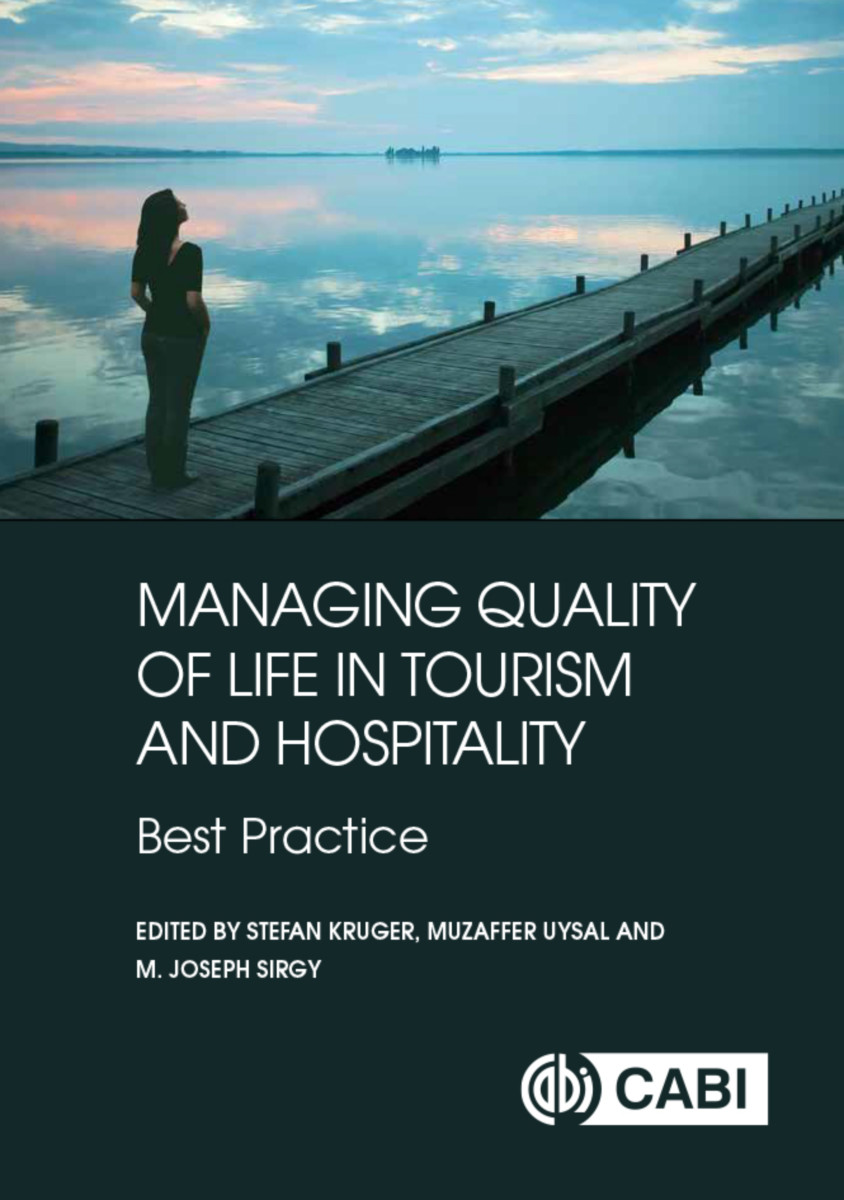Managing Quality of Life in Tourism and Hospitality
Best Practice
- Publisher
CABI - Published
14th December 2018 - ISBN 9781786390455
- Language English
- Pages 200 pp.
- Size 6.75" x 9.60"
This book brings together the latest findings within these areas from researchers and practitioners and delivers them to the forefront of knowledge application with examples in tourism and hospitality settings.
Quality-of-life research in tourism and hospitality has gained much momentum and can be classified in terms of three major categories: (1) quality-of-life research that focuses on tourists/guests and the impacts of specific tourism and hospitality programs on the overall quality of life of tourists/guests. (2) Quality-of-life research that focuses on employees of tourism/hospitality firms, such as the impact of work-life balance programs on front line service employees of hotels and (3) quality-of-life research that focuses on tourist communities including the impact of green community programs on the quality of life of residents of tourist communities.
Each chapter contains an example of best practice or a case study and concludes with a summary of lessons learned. These lessons can be applied by tourism and hospitality practitioners and community leaders and can be used to further research by academics working within tourism and hospitality.
Key Features
• Best practice case studies
• Broad coverage to include tourists, industry and local communities
• International application
1: Quality-of-life research in tourism and hospitality
2: Flamenco, tourists' experiences, and the meaningful life
3: "To mix with new people:" The surprising day trips of mature Germans
4: Creating moments of happiness on day trips
5: Social tourism as correlates of QoL: The case of disadvantaged people
6: How to make someone feel welcome somewhere, and mean it. L'accueil might be the answer
7: Sightseeing tours' impact on wellbeing and eudaimonia
8: Thermal spas, wellbeing and tourism
9: Rural wellbeing tourism in Northern Europe - Providing opportunities to enhance quality of life
10: The bet is on: A case study of the Naudé-Potgieter model of casino employees' happiness in the workplace
11: Quality of life research in tourism and hospitality: Implications and future research
Stefan Kruger
Stefan Kruger was born in Kroonstad, in the Free State Province of South Africa. After working for some time in the Tourism and Hospitality Industry (in management positions), he started an academic career at the Walter Sisulu University. He is currently employed at the School of Business Management (Tourism Management Program), North-West University, Potchefstroom. He holds a Doctorate degree in Tourism and Hospitality Management. His research interests include Quality of Life, Subjective Well-being, Positive Psychology in Tourism and Hospitality. Since 2004, he has published various peer-reviewed articles in DHET accredited journals and has attended various conferences, both nationally and internationally. In 2008 he was invited by the Hungarian Ministry of Local Government as the only South African to participate in a workshop on tourism-specific quality of life methodology in Budapest. Stefan has been elected as editorial board member and/or reviewer for the well acclaimed Journal of Applied Research in Quality of Life (2012), Tourism Analysis: A multidisciplinary journal (Editorial board member, 2014) and the African Journal of Hospitality, Tourism and Leisure (African Advisory editorial and/or reviewer board, 2014). Stefan has been appointed as the Regional Editor for Africa: Tourism Analysis and Interdisciplinary Journal in 2014. He is currently a member of the International Society of Quality of Life Studies, the South African Chefs Association, the Federated Hospitality Association of South Africa, CHASA, and has completed his dedicated hunting license certificate.
Muzaffer Uysal
Muzaffer Uysal is a professor and chair in the Department of Hospitality and Tourism Management, Isenberg School of Management at University of Massachusetts. He is a member of International Academy for the Study of Tourism, the Academy of Leisure Sciences, and serves as co-founder of Tourism Analysis: An Interdisciplinary Journal. In addition, he sits on the editorial boards of more than ten journals, including Journal of Travel Research and Annals of Tourism Research. He has authored and co-authored numerous articles, monographs, and several books related to tourism research methods, tourist service satisfaction, tourism and quality-of-life, experience value in tourism, tourism-related scales, and management science applications in tourism and hospitality. Dr. Uysal has received a number of awards for research, excellence in international education, teaching excellence, and best paper awards. His current research interests focus on tourism demand/supply interaction, tourism development, and quality-of-life research in tourism.
M. Joseph Sirgy
M. Joseph Sirgy is a management psychologist (Ph.D., U/Massachusetts, 1979), Professor of Marketing, and Virginia Real Estate Research Fellow at Virginia Polytechnic Institute and State University (Virginia Tech). He has published extensively in the area of marketing, business ethics, and quality of life (QOL). He is the author/editor of many books related to consumer marketing and quality of life. He also served as editor of the QOL section in the Journal of Macromarketing (1995-present). He received Virginia Tech's Pamplin Teaching Excellence Award/Holtzman Outstanding Educator Award and University Certificate of Teaching Excellence in 2008. In 2010, ISQOLS honored him for excellence and lifetime service to the society. In 2010 he won the Best Paper Award in the Journal of Happiness Studies for his theory of the balanced life; in 2011 also he won the Best Paper Award in the Journal of Travel Research for his goal theory of leisure travel satisfaction. In 2012 he was awarded the EuroMed Management Research Award for outstanding achievements and ground breaking contributions to well-being and quality-of-life research. He also was the editor of ISQOLS/Springer book series on handbooks in QOL research and the community QOL indicators best practices.


